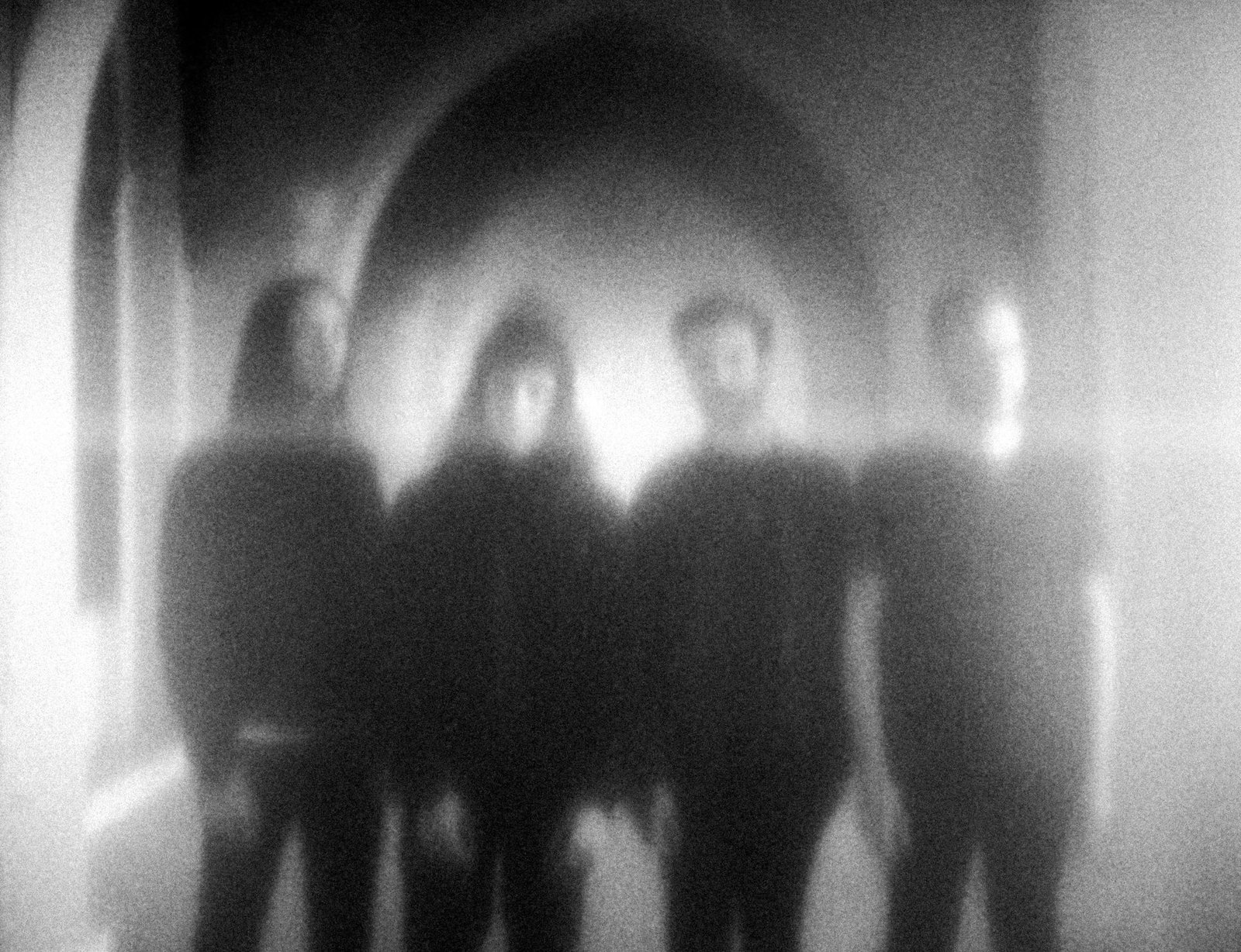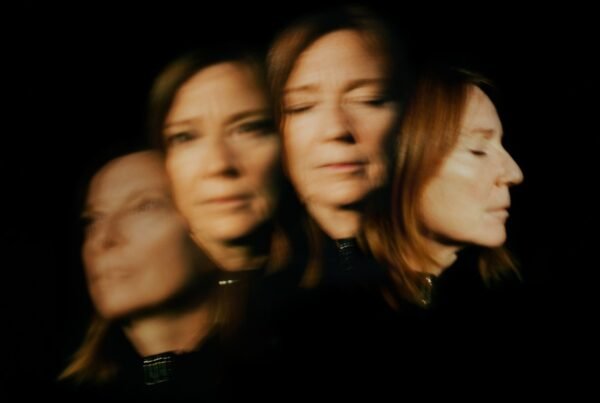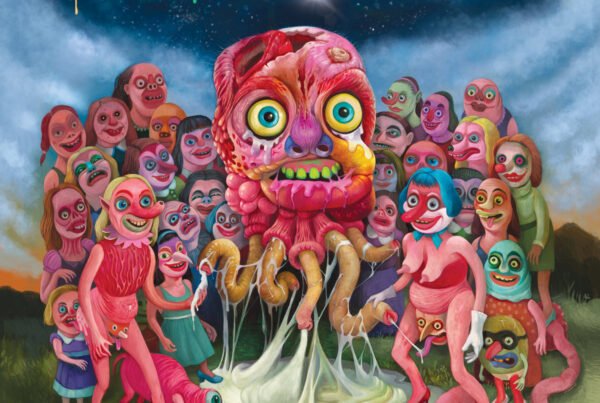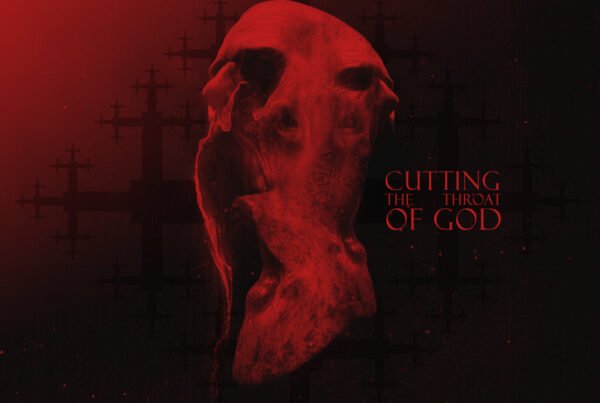For the last several years – like, about a decade – I’ve been listening to music at home in an… interesting fashion. Due to my desk size and lack of space, I’ve had my external Altec Lansing speakers plugged into my laptop and situated on an elevated platform intended for a big CRT computer monitor to the right of my main workspace and where the laptop is. In short, I’ve only really, clearly, heard all the music played on my laptop in my right ear for years outside of headphone use. Finally, this week, I got a new desk with more real estate to move shit around and, finally, my speakers are situated on either side of my laptop for a stereophonic experience. Yes, I have entered the twentieth century, please applaud.
I’m really glad I was able to do this, especially now, because it was key to my experience with BRUIT ≤, a French quartet specializing in post-rock with a modern classical tint. This is decidedly not my bag as I’ve said before elsewhere, but I do find myself drawn to specific artists, and this is definitely one of them. Ever since I heard “Renaissance”, I felt enraptured with their delicately powerful sound, windswept by their commanding of many classically-oriented instruments. The four main members of the group employ drums, guitars, bass, cello, keyboards, and violins. Some guests assist with clarinet, French horn, vibraphone, and bass trombone. This is… decidedly classical, but made for a modern audience with modern problems.
And hey, I’m down with that! It’s just not stuff I tend to go to for any particular reason. I more so like it when classical elements leak into other works, like hip-hop, soul, disco, or progressive music. BRUIT ≤ is different. Here’s a band that can make my arm hair stand on end or my eyes well up with water from sheer beauty. Across four songs, this album (inhale), The Machine Is Burning And Now Everyone Knows It Could Happen Again (exhale), is the true definition of a journey, and one with a lot more weight than it may appear at first glance.
The scope and sonics behind it all feel all-encompassing, complete; as if to traverse the whole of life from childhood to old age, from crawling to shuffling. Sweet beginnings and bitter ends. I soon found out in my research for this review that this was kind of by design. Per the band, it’s ‘an existential tale describing a humanity that experiences apocalypse and rebirth‘. There’s more granular and conceptual details for each song written here on the band’s Facebook, some of which I could piece together, but reading cursive isn’t exactly my strong suit.
Although there is a clearly outlined story to it all, one only needs to listen to the album themself in order to reap its visions, even if they differ from what was intended. “Industry” is where you’ll start, with a more percussive and mechanical take on the band’s music. For me, it was the building of life, the formation of souls to traverse the planet, and fitting them into a framework like cogs in a machine. It does have a menacing air to it, as pretty and serene as it can be, and that (again) was by design. Near the end of the track, you hear a man monologue in French. It’s French geneticist and communist party member Albert Jacquard, who, to paraphrase, laments the state of capitalist economic structure and its impact on society with how it fosters unhealthy, unsustainable, and surely unwinnable competition among us where there are many more losers than winners. Translated, he quips in part:
‘I believe that this economic system that we are developing is a system of constant struggle. ‘I must win over the other‘, ‘I must be first‘, ‘I must be competitive‘. This is absurd, it only leads to disasters, this is what we see now and I wonder why we are sticking to it anyway. Dare to tell a child, ‘I hope you get first‘, I think it’s a crime.‘
Thanks to BRUIT ≤ for including all of this in their notes, because I sure as hell wouldn’t have known otherwise. Anyway, with this in mind, it’s easier to contextualize “Industry” as what it is – a track with a fire within, the kiln of our known existence, but just as it gives us shape and form, it also threatens to melt us down and cremate us into soot with the most powerful people (or corporations if you’re so inclined) acting as undertaker. The violin and cello stand for the authoritative eyes of a Big Brother-esque figure, swaying slowing back and forth across us all to ensure no rabble-rousing occurs. Drums are the most intense here on the album, acting as stamping feet on our concrete streets and signifying our engagement with the greater system. Walks to go to work, walks to school, for groceries – our embedded, mundane routines given a sonic form too lovely for the trite comparisons I make.

We so quickly get accustomed to our ways of life within this system. We learn our places, dictated by a number of factors (not the least of which is class), and we set out to survive. I can’t even use the word ‘live’ for most instances, because what we are allowed to do in the general sense is survive, not live. We find pleasure in the places we can, helping ourselves and others as we are so inclined to unless the corruption of competition runs deep, and we survive. I think BRUIT ≤ understand this, given their apparent taste in leftist philosophy and the structure of their music. They erected a machine, one rife with many allegories to our own lives, just to set it on fire, as the album’s title telegraphs.
“Renaissance” represents a breakaway from the status quo, a realization that things don’t have to be the way they are and that they can change. With acoustic guitar and our other stringed friends returning, we’re treated to an immense wave of freedom. The smog-choked air from decades of industrialization that “Industry” showed us is wiped clean by crisp wind and openness afforded to us by nature, or God if you prefer. Our planet, the only one we have, struggles to deal with the stress we put it through, just as we struggle with our manmade systems of economic, social, and political oppression. “Renaissance” is a release from all of that, a display of post-rock crescendo with the climax being ultimate, pure freedom; a moment of exaltation you can repeat ad nauseam. A dream now in reality, but sometimes a dream is all we have.
“Amazing Old Tree” is one of thousands of structures freedom, and nature, affords us with. It represents the harmonious relationship we’re ideally to have with nature, giving and taking in unison, us providing carbon dioxide for trees to convert into oxygen for life, not just survival. The song does come with a warning though, courtesy of quoted speech from If a Tree Falls: a Story of the Earth Liberation Front, a 2011 documentary. Heard is a man with some grit and age in his voice detailing a piece of a tree estimated to be around 500 years old, and mourning the thought that trees like it won’t exist for another few hundred years – ‘and that’s if we leave them alone‘. The man is Bill Barton, an experienced logger, member of the Native Forest Council, and environmentalist. ‘The industry tends to call environmentalists ‘radicals’,’ he says at the end of the track. ‘The reality is that 95% of the standing native forest of the United States had been cut down. It’s not radical to try and save the last 5%, what’s radical is logging 95%. This is radical.‘ A sobering realization that many of us don’t take seriously enough, and one that BRUIT ≤ do well to not let us forget.
Still, the band implore us to enjoy what we have, while we have it. The musical structure that they form around these quotes and contexts serves the message, personifying the nature we take advantage of and take for granted as a swirling force made of energy just as much as tangible matter. The buzzing of synthesizers lets us hear the unseen electricity that makes everything be crackle in the air. Dew from leaves dripping into surrounding flowing streams can be heard in reverberating piano notes; the spaciousness of it all uncannily sounds like the open sky, resolute in its day-night cycles, housing the sun and cradling the moon.
Finally, we are left with “The Machine Is Burning”, a eulogy for the old ways. The song is suspenseful, devoid of any quotes or specific framing outside of what the music itself provides, and it’s all the better for it. Another crescendo builds from early on, gradually folding in all instruments from before with more intensity as if to portray that all-consuming fire burning away what ails us. After it eventually dies down, the remaining reverb-laden guitar feels quaint and clean like a new beginning. You are left with nothing, yet everything. It feels revelatory, like a divine experience; you’ve given another chance, this time with absolutely invaluable knowledge that things can be different, that priorities can be reassessed for the greater good of your people and for the land that sustains you. Finally, you are allowed to live, not merely survive.
BRUIT ≤ handed me an opportunity like no other when I chose to review their album. From the minute (speaker placement truly matters) to the meaningful (we must change if we are to live on), the story of The Machine Is Burning… is holistic, just as open to interpretation as it is raw enjoyment. I cannot understate how much of a wonder it is to listen to, to feel its imposition on my body and the subsequent release of its hold to show a profound autonomy we’re all capable of if not for outside domineering factors. It offers a glimpse into the possible by erasing the impossible, blazing a path for those to follow if they choose. This is just as true for how we exist as it is for the medium of music itself. Although we are parts of various machines – both malicious and self-serving – there’s also a machine inside all of us. BRUIT ≤ show is that it can burn down, and now we know it could happen again. All we have to do is strike the match.







What are the two men carrying in the case coming out of the van. Looks heavy.
[…] a different reading of it and it would probably be as valid, still. In fact, I’ll link this article here, in case you’re interested. It takes a more incisive look into the album and the writer […]